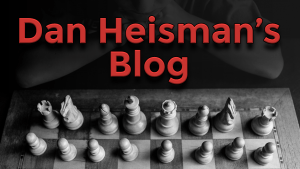Q&A with Coach Heisman Jul 5, 2013
My Top Tips for Chess Improvement included hanging out with strong players and reviewing your games with them, ala The Improvement Feedback Loop, consistently trying your best on every move (since it only takes one bad move to lose a game), and using almost all your time every game, The Goldilocks Principle. And yes, speed games can be good for you in moderation, providing you look up your openings after each series of games, with the goal of never making the same mistake twice, all old stuff from Getting the Edge, which includes my best but least followed advice.
At the start of the show I presented an exercise from IM Levitt's insightful book Genius in Chess: In the following position, as fast as you can (time yourself), figure out two numbers: 1)The number of legal moves that White has in this position, and 2)How many of those moves deliver checkmate to Black:
----
----
----
----
----
----
----
----
----
----
----
----
----
----
----
----
----
The answers are
1) White has four pieces that can move. The number of moves that each has is Queen (4), Bishop (7), Rook on d2 (10), and Knight on e3 (8). So White has 29 legal moves
2) All four queen moves deliver a direct mate and all 25 other moves are a discovered mate, so all 29 moves are checkmate as well.
What IM Levitt discovered by giving these type of timed puzzles to several strong players is that it is possible to differentiate the playing strengths of players based primarily on their board vision, i.e., the faster and more accurately someone solved these puzzles, the better they were. This result would not be at all surprising if he gave them regular, White to play and win/draw/mate puzzles, which require finding "good" moves. But puzzles like the one above simply require finding legal moves and assessing whether the moves are checkmate, and thus don't require skills much above the raw beginner level. Such a puzzle also does not require any knowledge of openings or endgames or even tactics; you might think a bright person with some chess experience could compete with highly rated players since the only question is to count legal moves and ascertain whether they are checkmate. But it turns out this type of "board vision", like other visions (visualization, tactical vision) are crucial fundamental skills which support other, more advanced, analytical skills. So there is a high correlation between the speed and accuracy of scoring in board vision puzzles vs playing strength.
I mentioned that there are two columnists at Chess Cafe who specialize in board vision and visualization puzzles, Bruce Albertson with Chess Mazes and Jeff Coakley with The Puzzling Side of Chess. Jeff is also a wonderful author with four books I recommend, starting out with two that feature fun (and not necessarily easy) board vision - and other - puzzles: Winning Chess Puzzles for Kids Vol 1 and Vol 2. His Winning Chess Strategy for Kids is on the best primers on strategy and positional chess (for all ages), including a great writeup explaining Steinitz' Rules. Finally, his Winning Chess Exercises for Kids is, in my humble opinion, the best intermediate (rating 1600+) puzzle book ever written. It runs rings around a similar book, Reinfeld's classic 1,001 Chess Combinations and Sacrifices - compare and see! Be warned about Coakley's books - they aren't just for kids! Jeff's titles can mislead you into thinking they are much easier than they are, even if most booksellers I encounter at big events place his books in the book store next to Dick and Jane Learn the Chess Moves  .
.
As usual, I got the "new-viewer" or perhaps "troll special" questions, "Is the X a good opening for beginners/1400 players/me?" I quoted Alburt and Lawrence quoting me in their book Chess Rules of Thumb: "Any opening you know well is good no matter its reputation." I also refer to two articles I wrote, first What's a Good Opening? for Chess.com and also Misquoted or Misinterpreted (now 99 cents archived at Chess Cafe). In the latter I discuss at some length yes, openings are important and yes, which opening you choose, especially as you get stronger, can be important but no, which opening an inexperienced player happens to be playing at a given time is usually not that important. What's important is to take time to learn the opening, follow good opening principles no matter what the opening and, as noted at the top of this article, look up openings in books, databases, or computer engines to not make the same mistakes over and over. I think regular listeners are starting to groan when they hear a newbie ask me "Is the X opening a good opening?" and maybe that's a good thing...
We also got on the important topic of learning openings, middlegames, and endgames from reading lots of annotated master games, rather than just "How to play the middlegame" books. And I stressed the importance for players under 1700 or so to begin with game books written for instruction, rather than other reasons; the latter includes most well-known chess books like Fischer's My 60 Memorable Games and Karpov's Best Games. An example of books written for instruction would include MacDonald's five-volume series starting with The Art of Logical Chess Thinking. My website has a list of recommended instructive anthologies. If you don't understand the difference or why I suggest you tackle the instructive books first, I highly recommend you take a few minutes and link and read Annotated Game Collections vs Instructive Anthologies. It will be well worth your time.
Someone asked me the "time machine" question about what Morphy would be rated today. I think it depends on whether you give him some reasonable time to catch up on chess theory of all types before throwing him to the modern wolves. If you assume he is given such opportunity and brought him to 1969 when Spassky was the World Champion with a FIDE rating of 2690, then the "Modernized Morphy's" rating would be in the 2600's. However, due to inflation in the past 40+ years, if you took him up to 2013, an "updated" Morphy would certainly not be worse than all 40+ players in the 2700+ category, so his rating would easily be 2700+, possibly pushing 2800. It's just my opinion; you might have another but we'll never know...
The very first FEN I was given in the show failed to an "Illegal FEN" notice from Chess.com's live server. So my suggestion is that before you submit a position to me on the show, please check it out by hitting the server's "FEN" button on the right of your screen and then inserting it. If it works and is the position you wish, then feel free to submit it as part of a question for the show.
I got asked about my Chess.com hat (well, the question was really about "that" but mis-spelled...) so that gave me an opportunity to plug not only the Dan Heisman Learning Center here at Chess.com, which features slow play and a lot more, but also our store, which sells similar gear. All proceeds go to my chess charity at The Philadelphia Foundation, so if you like the show or these articles and are looking for a chess hat or shirt or mug or ? for your next chess event, check us out! Thanks!
This was the final show before my birthday. I still will have lived fewer years than squares on a chessboard, but that won't last long. The next show will be on July 19 will be for all Chess.com members.






